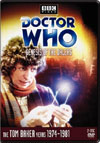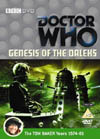DVD Extras include:
Entrances....Originally, the TARDIS was to have appeared at the beginning of this story, in some sort of limbo garden for the meeting with the Time Lord messenger. I'm still unsure whether or not I would have liked this better. Decent visual materalization(s) with proper sound? Scenes in the TARDIS interior, juxtaposed with exterior scenes as the characters go through the TARDIS doors? Using the TARDIS to go from garden to Skaro instead of the far less interesting time-ring? One would probably need it all to outdo the excellent opening sequence that eventually got filmed:We open immediately on Skaro, where a brutal, surreal shootout between gas-masked soldiers brilliantly sets the scene with memorable imagery. Tom Baker's Doctor then gets a beautiful and unusual entrance as he emerges from the fog, unsure of where or when he is, and more importantly why, just like Sam Beckett at the beginning of any good Quantum Leap episode. The audience is allowed to clue in to the situation along with the Doctor, as a Time Lord fills everyone in on what is to follow. Not unlike Al the hologram from Quantum Leap either. The location footage in the first episode is really nicely done, an essential element for establishing the setting. Indeed, it becomes so well established in the viewers' minds that it is easy to not notice that no outdoor locations feature in the remaining five episodes. The one important exterior setting done indoors in the studio is the trench, which works well in most cases. The only big let-downs in the production are the all too obvious cuts from exterior locations directly to the trenches, where it looks as though things change from day to night in half a second. Raising the lighting in the background of the studios seems the only way to get around this in early shots; the foreground and the main characters already seem bright enough to pass for day. Later portions may have done better with cross-fades, to give the impression that there was enough time for day to become night.
Why it Works...The two best stories of season one have now merged in this one: We have a time-travel conundrum reminiscent of "The Aztecs" (story no. 6), only this time the Doctor has taken Barbara's place as the one aiming to fashion a new history, and his mission will pit him against "The Daleks" (story no. 2) on their home turf once more. Wisely, his original position on time travel and becoming involved with history from "The Aztecs" has caved in after all, and he's learned to go with his heroic impulses instead. Barbara has at last won her argument, but good. A new history? "That's feasible," he reasons.The first two episodes feature a lot of formulaic Terry Nation plot elements, with a silent Sevrin stalking Sarah Jane in the first episode, and becoming her talkative trusted ally in the second. We've also got a lot of capture and escape routines, and some travel through menacing environments with primitive creatures waiting to prey on our main characters. But "Genesis" keeps the pace up on these segments, and already begins laying the groundwork and background for the political thriller with heavy moral overtones that it will soon become. As usual, we have to wait for the end of the first episode for our first view of a Dalek, but this works quite well considering that the Daleks are only prototypical at this stage, and also that we get an additional entrance by the great half-dalek Davros as well.
"Perfect! The Weaponry Is Perfect! Now We Can Begin...."More congratulations are due the production team with this story. Although the traditional full-screen negative-image effect is still applied to the targets of Dalek weapons fire, neatly maintaining a nostalgic continuity, this is now finally augmented by a decent visual beam effect, in a nice cyan colour too. At last! In fact, this is practically the first decent visual beam effect ever produced on Doctor Who thus far. The only notable exception that comes to mind is Morris Barry's "The Moonbase" (story no. 33) in which visual beams were necessary to show the gravitron deflect the weapons fire of some heavy outdoor cyber-artillery, and apparently only achievable with a special film sequence prepared well in advance. Now, major Doctor Who monster-characters can use a decent effect in their everyday walk-and-stalk shoot-em-ups in the video-tape studio. To paraphrase Davros, this was a moment that lived long in history.
Avoiding the Usual Writing PitfallsBy episodes three and four, the ante has been upped, and the political aspects of the story reach their height. Beginning with Ronson, the Doctor is very forthcoming and truthful about his origins, his opinions, his reasoning, and his intentions - practically the opposite of many a David Whitaker script. Also, just when you might think he'll be stuck wrestling fake clams in the cave for most of an episode to formulaically pad the scripts, no, he instead convinces reasonable people like Mogran and antagonistics like Ravon over to his side with a refreshing swiftness and believability, practically the opposite of the endless philosophical head-butting of the typical Malcolm Hulke script. Now the story proceeds from this more interesting place to a form of political stake-raising and back-stabbing that more accurately reflects truly dangerous power figures hidden throughout our democracies today.Plenty of critical action bridges the middle episodes, like a furious exchange of chess pieces during the middle game that leaves the player who had a slight advantage before holding a far bigger advantage towards the end.
"A fascinating idea!"By far the most interesting confrontation between the Doctor and Davros overlaps episodes four and five. Of all the confrontations they have in this story and the sequels, this is by far the most civil, as both are keen to explore each other's character, and both make genuine attempts to convince the other of their point of view.The Doctor does miss a good opportunity though. Davros is so keen to learn what mistakes the Daleks make in the future, the Doctor could have easily given him the honest answer that their very conscience-less characters were the greatest factor in their defeats.... they constantly created enemies everywhere they went needlessly. Surely they wouldn't fall victim to all those military traps if they were a well-liked species and people didn't lay military traps for them in the first place. Ah well, hindsight is always 20-20, and the Doctor mustn't always be expected to think of everything in the heat of the moment either. Episodes five and six deal with the end game, a democratic rebellion thick with moral arguments, although a bit of sporadic action also allows scientist-clad stunt-arranger Terry Walsh to shoot someone and get a reprimand. The arguments are a bit on the simplistic side, but carry with them an air of truth both in the way they are delivered, and in the varying degree of importance the characters are placing in them. And it all builds to a powerful and disturbing climax.
Moral DilemmaThe Doctor is still given quite a bit to do in the final episode, but most of it is far removed from Davros and the other central figures in the bunker, perhaps a trifle too conveniently. He too has perhaps his most infamous moral dilemma at the beginning of the episode, and there is a lot to consider. To further his analogy of pointing out a child who will become a ruthless dictator and wrestling with the question of killing that child, one must add to that the fact that those very children have recently wrapped themselves around the Doctor's neck in an attempt to throttle him. Self-defense comes into play here. Then again, the Doctor was the invader of their nest, so to speak, so it is arguable that the embryo Daleks are the ones doing the self-defense. Well, there are also all the Thals that the Daleks have recently wiped out to consider as well. There isn't much argument for the Dalek children to be "innocent" even at this early time. But as it always should, the question really boils down to what kind of character the Doctor is at his centre. He wrestles with the issue admirably, and in the end he cannot stoop to their level. And even though Terry Nation changes the Doctor's mind on the issue once more, it is neatly and appropriately left to a Dalek to take the action to do the children in as well.As with "The Aztecs", there's enough action and energy to make the concluding episode very satisfying, but the true resolution is purely philosophical. It goes by quite quickly at the end, and the production team may have been scrambling to get it in the can in time, but it is done well and given great emphasis, making it unforgettable.
Points for StyleAlthough Dudley Simpson's music for season twelve has been vastly superior to his efforts during the previous two years, his score for "Genesis of the Daleks" still manages to disappoint me, most specifically that it is a lost opportunity for Simpson to create more definitive new themes, and one for the Daleks in particular. Many of the action sequences give Simpson's music centre stage, and he comes up with a good style for the music: appropriately harsh instrumentation (very reminiscent of Malcolm Clarke's later Dalek music) and a bit of beat and rhythm.... but where's the thematic hook, the melody, the unforgettable anthem? Even the Grainer-esque pulses from "The Evil of the Daleks" (story no. 36), curiously enough never used in any further Simpson Dalek scores, would have worked better, but that too was lacking a memorable melodic voice.
International Titles:Deutsch: "Genesis der Daleks"Magyar: "Dalekek eredete"Français: "La Genèse des Daleks"Русский: "Происхождение далеков"
This story has become available on DVD and VHS video. Click on the Amazon symbol for the location nearest you for pricing and availability:
Comments on this article are welcome. You may contact the author from this page:
|









